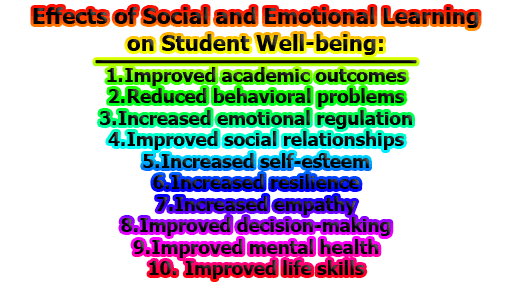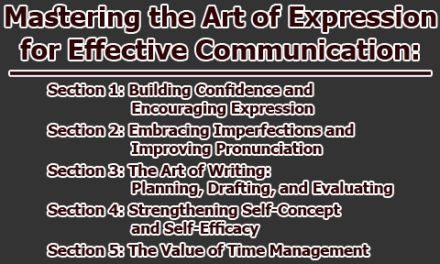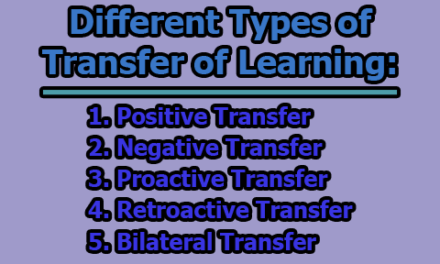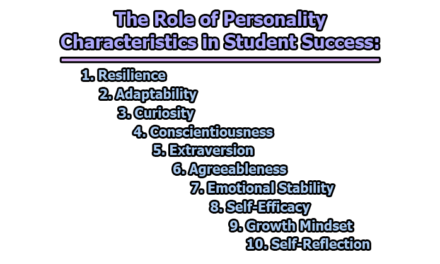Social and emotional learning (SEL) is a critical aspect of education that focuses on developing students’ emotional intelligence and positive social behaviors. It refers to a set of competencies and skills that enable individuals to identify and manage their emotions, establish positive relationships, make responsible decisions, and communicate effectively. SEL programs have been gaining popularity in schools, and research has shown that they can have a positive impact on student well-being. In this article, we will discuss the effects of social and emotional learning on student well-being.
What is Social and Emotional Learning?
Social and emotional learning (SEL) is the process through which individuals acquire and apply social and emotional skills, attitudes, and values. These skills enable individuals to recognize and manage their emotions, show empathy towards others, establish and maintain positive relationships, and make responsible decisions. SEL involves developing self-awareness, self-management, social awareness, relationship skills, and responsible decision-making skills.
The Importance of SEL in Education:
Social and emotional learning is critical in education for several reasons. Firstly, research has shown that students who participate in SEL programs tend to have better academic outcomes. They exhibit improved attitudes towards learning, higher academic achievement, and are less likely to drop out of school. Secondly, SEL programs promote positive social behaviors, which can help reduce problem behaviors such as aggression, violence, and substance abuse. Thirdly, SEL programs help students develop resilience and coping skills, which are critical in managing stress and other negative emotions.
Effects of Social and Emotional Learning on Student Well-being:
Social and emotional learning (SEL) has been found to have a positive impact on student well-being. Here are ten specific effects of SEL on student well-being:
- Improved academic outcomes: SEL programs help students develop self-awareness, self-management, social awareness, relationship skills, and responsible decision-making skills. These skills have been linked to higher academic achievement, as they enable students to better manage their time, stay organized, focus on their goals, and persist through challenges.
- Reduced behavioral problems: SEL programs help students develop skills such as empathy, self-control, and problem-solving, which can reduce behavioral problems such as aggression, bullying, and substance abuse. These skills can also help students develop positive conflict resolution skills and better manage interpersonal relationships.
- Increased emotional regulation: SEL programs help students develop emotional regulation skills, which can enable them to better manage negative emotions such as anxiety, anger, and stress. This can lead to improved mental health and well-being, as students are better able to cope with challenges and setbacks.
- Improved social relationships: SEL programs promote positive social behaviors such as empathy, communication, and collaboration, which can help students establish and maintain positive relationships with peers and teachers. Positive social relationships have been found to have a positive impact on student well-being and academic outcomes.
- Increased self-esteem: SEL programs help students develop a positive self-image and self-esteem, which can reduce feelings of loneliness and isolation. By building self-confidence, students are better able to engage in positive social interactions and take on academic challenges.
- Increased resilience: SEL programs help students develop resilience and coping skills, which can help them bounce back from adversity and overcome challenges. These skills can also help students develop a growth mindset, where they view challenges as opportunities for growth and learning.
- Increased empathy: SEL programs help students develop empathy and compassion for others, which can improve social relationships and reduce negative behavior. Empathy can also help students develop a better understanding of diverse perspectives and cultures.
- Improved decision-making: SEL programs help students develop responsible decision-making skills, which can enable them to make better choices and avoid risky behaviors. These skills can also help students understand the consequences of their actions and make informed decisions.
- Improved mental health: SEL programs have been found to reduce symptoms of anxiety, depression, and stress, which can improve overall mental health and well-being. By developing emotional regulation skills, students are better equipped to manage their mental health and cope with stressors.
- Improved life skills: SEL programs help students develop life skills such as problem-solving, goal-setting, and communication, which are important for success in school and in life. These skills can help students become more self-directed and effective in achieving their goals.
Finally, we can say that social and emotional learning is critical in promoting student well-being. SEL programs have been found to have a positive impact on mental health, academic outcomes, social relationships, and resilience. Schools should prioritize social and emotional learning by incorporating it into their curriculum and providing opportunities for students to develop their social and emotional skills. By doing so, schools can help students develop the skills they need to succeed academically and lead fulfilling lives.
References:
- Durlak, J. A., Weissberg, R. P., Dymnicki, A. B., Taylor, R. D., & Schellinger, K. B. (2011). The impact of enhancing students’ social and emotional learning: A meta-analysis of school-based universal interventions. Child development, 82(1), 405-432.
- Greenberg, M. T., Weissberg, R. P., O’Brien, M. U., Zins, J. E., Fredericks, L., Resnik, H., & Elias, M. J. (2003). Enhancing school-based prevention and youth development through coordinated social, emotional, and academic learning. American Psychologist, 58(6-7), 466-474.
- Jones, S. M., & Bouffard, S. M. (2012). Social and emotional learning in schools: From programs to strategies. The social policy report, 26(4), 1-33.
- Brackett, M. A., & Rivers, S. E. (2014). Transformative social and emotional learning (SEL): A framework for SEL in the 21st century. New directions for youth development, 2014(144), 13-30.
- Schonert-Reichl, K. A., & Lawlor, M. S. (2010). The effects of a mindfulness-based education program on pre-and early adolescents’ well-being and social and emotional competence. Mindfulness, 1(3), 137-151.
- Catalano, R. F., Berglund, M. L., Ryan, J. A. M., Lonczak, H. S., & Hawkins, J. D. (2004). Positive youth development in the United States: Research findings on evaluations of positive youth development programs. The Annals of the American Academy of Political and Social Science, 591(1), 98-124.
- Payton, J. W., Wardlaw, D. M., Graczyk, P. A., Bloodworth, M. R., Tompsett, C. J., & Weissberg, R. P. (2000). Social and emotional learning: A framework for promoting mental health and reducing risk behaviors in children and youth. Journal of school health, 70(5), 179-185.
- Taylor, R. D., Oberle, E., Durlak, J. A., & Weissberg, R. P. (2017). Promoting positive youth development through school-based social and emotional learning interventions: A meta-analysis of follow-up effects. Child development, 88(4), 1156-1171.
- Elias, M. J., Zins, J. E., Weissberg, R. P., Frey, K. S., Greenberg, M. T., Haynes, N. M., … & Shriver, T. P. (1997). Promoting social and emotional learning: Guidelines for educators. ASCD.
- Weissberg, R. P., Durlak, J. A., Domitrovich, C. E., & Gullotta, T. P. (Eds.). (2015). Handbook of social and emotional learning: Research and practice. Guilford Publications.

Library Lecturer at Nurul Amin Degree College










